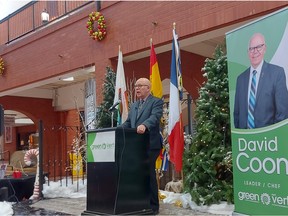More needed on property tax reform: Greens
Party calling for elimination of cap that limits heavy industrial and commercial property tax rate multipliers at no higher than 1.7

Article content
Green Party leader David Coon says successive Liberal and Progressive Conservative governments haven’t done enough when it comes to reforming the province’s property tax system, in light of Saint John’s 2024 property tax revenue boost falling fully on the backs of residents.
While in Saint John on Wednesday, Coon and Green finance critic Kevin Arseneau said they were willing to back city council’s ask of the province to give local governments more flexibility in setting tax rates should they form government.
Mainly, this would mean the elimination of a cap that limits heavy industrial and commercial property tax rate multipliers at no higher than 1.7, as well as giving municipalities the ability to establish more tax classes.
“New Brunswick’s property tax assessment system requires a major overhaul,” Coon said, calling his party’s proposal a “substantial plan.”
As the legislation stands now, New Brunswick has three property tax classes: residential, non-residential (commercial) and heavy industrial. Municipalities are free to set the residential tax rate as they wish, but are limited in setting the rate of other classes to between 1.4 and 1.7 times the residential rate.
Before 2023, when Tory government changes to the property tax system were introduced, the multiplier was set at a static 1.5 and there were just two classes: residential and non-residential, the latter covering everything from a corner store to a refinery or pulp mill.
But Saint John council, as well as city staff, have repeatedly said the changes, while welcome, don’t go far enough.
New Brunswick’s property tax assessment system requires a major overhaul.
David Coon
Numbers presented as part of the 2024 budget setting process illustrate this, they say.
Next year, the draft 2024 operating budget for Saint John proposes to decrease the residential tax rate by four cents, down to $1.58 per $100 of assessed value. Using the 1.7 multiplier, it places both the commercial and heavy industrial tax rates at $2.686 – down 6.8 cents from the year before.
Against the backdrop of soaring residential assessment based growth of 12.7 per cent in 2024 and lacklustre growth in the commercial and heavy industrial sectors of 3.19 per cent and 0.44 per cent respectively, even with a tax rate cut, Saint John residents will collectively pay $8.49 million more in property tax next year.
While commercial properties will see a collective $270,000 overall increase on their municipal tax bills next year, heavy industry will actually pay $292,000 less.
The result is Saint John’s property tax revenue increase of $8.47 million in 2024 is more than 100 per cent covered by residential property owners, compensating for the decrease on the heavy industrial side.
“So provincial regulations, legislation, as it stands, is preventing the City of Saint John from collecting its fair share of taxes from large corporations and heavy industry, leaving Saint John residents to shoulder 100 per cent of the increase in tax revenue,” Coon said on Wednesday.
The proposal
Arseneau said the Saint John situation has been caused by “years of neglect.”
He proposed allowing local governments to set tax rate multipliers to “whatever they deem fair to recover the costs of hosting industry,” abolishing the 1.7 maximum.
Municipalities should also have the freedom to create unique tax classes in order to set separate rates depending on the type of business.
“Municipalities should be able to have a democratic conversation about what they believe is fair to charge the industries in their communities for the services that they get,” he said.
“This will allow places like Saint John to lower the taxes on residents while increasing the taxes on large corporations in heavy industry.”
The proposed plan is in line with what city CFO Kevin Fudge said at a finance committee meeting earlier in November.
Fudge said the city would prefer to remove all restrictions on the multiplier.
“In fact, we’d rather not have the residential rate tied to the other classes,” he said.
Asked about uncoupling commercial and heavy industrial tax rates from the residential rate entirely, Arseneau said it was part of a larger conversation about the autonomy of municipalities.
“But taking away the multiplier is the easiest way that we can be doing it right now,” he said, “to help Saint John and other municipalities across the province.”
Industry says tax increase could hinder growth
Previous calls for increases to the multiplier have raised concerns about competitiveness by industry reps.
Ron Marcolin, divisional vice-president for Canadian Manufacturers & Exporters, an organization that provides a voice for industry interests, said that Saint John and New Brunswick as a whole need to be mindful of attracting and retaining industrial companies, adding that higher taxes could result in companies reconsidering new hires, investments and maintenance.
While there are many expenses prospective companies might consider when determining a new location to set up shop, property tax is certainly on the list, Marcolin said. Eliminating the multiplier limit “skews everything to our disadvantage,” he added.
At the press conference on Wednesday, Coon said any companies saying they’d have to finds other means to cut costs due to increased property tax is “simply job blackmail.”
“Some industry will make these kinds of threats in their own self interest,” Coon said.
Marcolin said these weren’t “idle threats,” especially at a time when Saint John has indicated it wants to grow its industrial tax base. The city is proposing to increase spending by almost $400,000 on industrial parks next year.
“People will look to not spend money in New Brunswick if clearly the costs are too high,” he said.
“We could ultimately lose industrial and commercial business.”
Holt calls for decoupling of tax rates
In question period on Thursday, Liberal Leader Susan Holt called for the separation of industrial tax rates from residential rates, saying her party is “committed to property tax reform to ensure a transparent system in which everybody pays their fair share.”
“Municipalities such as Saint John, St. Stephen, and Saint-Quentin have been clear that the property tax system needs more classes and that the industrial and residential tax rates need to be decoupled in order for them to be able to improve affordability for New Brunswickers,” Holt said, before asking Local Government Minister Glen Savoie whether the government would commit to the rate separation.
Savoie noted that the financial portion of municipal reform, which includes property tax, is set to take place next year.
“When you look at the capacity that we have with our tax base, there is certainly a way that we can make sure that the province’s needs are met in terms of what we are responsible for and that the municipalities and other local governments are able to react to what they are responsible for,” he said, adding they will make sure “those things are kept in mind.”
In an email on Friday, Alycia Bartlett, communications director for the Finance and Treasury Board, said that “work on Phase 2 of local governance reform is ongoing.
“As part of that work, the financing of local governments will be considered further, including property taxation.”












Postmedia is committed to maintaining a lively but civil forum for discussion. Please keep comments relevant and respectful. Comments may take up to an hour to appear on the site. You will receive an email if there is a reply to your comment, an update to a thread you follow or if a user you follow comments. Visit our Community Guidelines for more information.